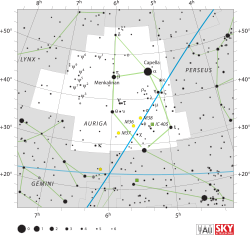Psi1 Aurigae – Wikipedia
| Psi1 Aurigae (ψ1) | |
 | |
| Observationsdata Epok: J2000.0 | |
|---|---|
| Stjärnbild | Kusken |
| Rektascension | 06t 24m 53,90129s[1] |
| Deklination | +49° 17′ 16,4199″[1] |
| Skenbar magnitud () | +4,91[2] |
| Stjärntyp | |
| Spektraltyp | M0 I[3] |
| U–B | +2,29[2] |
| B–V | +1,97[2] |
| Variabeltyp | Långsam irreguljär variabel (LC)[4] |
| Astrometri | |
| Radialhastighet () | +4,7[5] km/s |
| Egenrörelse (µ) | RA: -0,66[1] mas/år Dek.: -1,82[1] mas/år |
| Parallax () | 0,82 ± 0,28[1] |
| Avstånd | ca 4 000 lå (ca 1 200 pc) |
| Absolut magnitud () | -5,53[6] |
| Detaljer | |
| Massa | 14,4 ± 0,8[7] M☉ |
| Radie | 600(1) R☉ |
| Luminositet | 53 579[8] L☉ |
| Temperatur | 3 750[3] K |
| Metallicitet | +0,08[9] dex |
| Vinkelhastighet | 40[7] km/s |
| Ålder | 12,3 ± 0,4[7] miljoner år |
| Andra beteckningar | |
| 46 Aurigae, BD+49 1488, FK5 242, HD 44537, HIP 30520, HR 2289, SAO 41076. [10] | |
Psi1 Aurigae (ψ1 Aurigae, förkortat Psi1 Aur, ψ1 Aur) som är stjärnans Bayerbeteckning, är en ensam stjärna belägen i den nordöstra delen av stjärnbilden Kusken. Den har en skenbar magnitud på 4,91[2] och är svagt synlig för blotta ögat där ljusföroreningar ej förekommer. Baserat på parallaxmätning inom Hipparcosuppdraget på ca 0,82[1] mas, beräknas den befinna sig på ett avstånd på ca 4 000 ljusår (ca 1 200 parsek) från solen. Den är en långsam irreguljär variabel av LC-typ, vars magnitud varierar i storleksordningen 0,44.[4]
Egenskaper
[redigera | redigera wikitext]Psi1 Aurigae är en orange till röd pulserande superjättestjärna av spektralklass M0 I[3]. Den har en massa som är ca 14[7] gånger större än solens massa, en radie som är ca 600(1) gånger större än solens och utsänder från dess fotosfär ca 64 000[8] gånger mera energi än solen vid en effektiv temperatur på ca 3 750[3] K.
Referenser
[redigera | redigera wikitext]- Den här artikeln är helt eller delvis baserad på material från engelskspråkiga Wikipedia, tidigare version.
Noter
[redigera | redigera wikitext]- ^ [a b c d e f] van Leeuwen, Floor (November 2007), "Validation of the new Hipparcos reduction", Astronomy and Astrophysics, 474 (2): 653–664, arXiv:0708.1752v1 , Bibcode:2007A&A...474..653V, doi:10.1051/0004-6361:20078357. Note: see VizieR catalogue I/311.
- ^ [a b c d] Nicolet, B. (1978), "Photoelectric photometric Catalogue of homogeneous measurements in the UBV System", Astronomy and Astrophysics Supplement Series, 34: 1–49, Bibcode:1978A&AS...34....1N.
- ^ [a b c] Levesque, Emily M.; et al. (August 2005), "The Effective Temperature Scale of Galactic Red Supergiants: Cool, but Not As Cool As We Thought", The Astrophysical Journal, 628 (2): 973–985, arXiv:astro-ph/0504337 , Bibcode:2005ApJ...628..973L, doi:10.1086/430901.
- ^ [a b] Adelman, Saul J. (2001), "Stars with the Largest Hipparcos Photometric Amplitudes", Baltic Astronomy, 10: 589–593, Bibcode:2001BaltA..10..589A.
- ^ Wielen, R.; et al. (1999), Sixth Catalogue of Fundamental Stars (FK6). Part I. Basic fundamental stars with direct solutions (35), Astronomisches Rechen-Institut Heidelberg, Bibcode:1999VeARI..35....1W.
- ^ Schiavon, Ricardo P. (July 2007), "Population Synthesis in the Blue. IV. Accurate Model Predictions for Lick Indices and UBV Colors in Single Stellar Populations", The Astrophysical Journal Supplement Series, 171 (1): 146–205, arXiv:astro-ph/0611464 , Bibcode:2007ApJS..171..146S, doi:10.1086/511753.
- ^ [a b c d] Tetzlaff, N.; Neuhäuser, R.; Hohle, M. M. (January 2011), "A catalogue of young runaway Hipparcos stars within 3 kpc from the Sun", Monthly Notices of the Royal Astronomical Society, 410 (1): 190–200, arXiv:1007.4883 , Bibcode:2011MNRAS.410..190T, doi:10.1111/j.1365-2966.2010.17434.x.
- ^ [a b] Hohle, M. M.; Neuhäuser, R.; Schutz, B. F. (April 2010), "Masses and luminosities of O- and B-type stars and red supergiants", Astronomische Nachrichten, 331 (4): 349, arXiv:1003.2335 , Bibcode:2010AN....331..349H, doi:10.1002/asna.200911355.
- ^ Bakos, Gustav A. (October 1971), "Abundances of Heavy Elements in Late-Type Stars", Journal of the Royal Astronomical Society of Canada, 65: 222, Bibcode:1971JRASC..65..222B.
- ^ "psi01 Aur". SIMBAD. Centre de données astronomiques de Strasbourg. Hämtad 2012-08-23.
Källor
[redigera | redigera wikitext](1) Beräknat utifrån effektiv temperatur och luminositet, med hänvisning till den nominella soltemperaturen på 5 772 K


 French
French Deutsch
Deutsch



